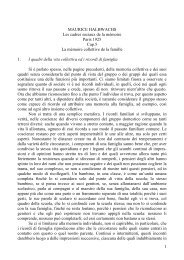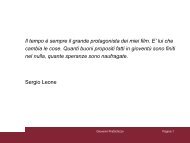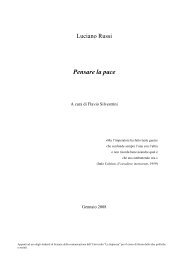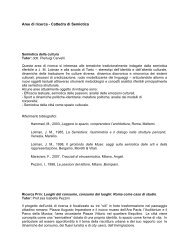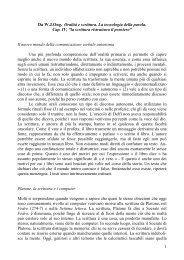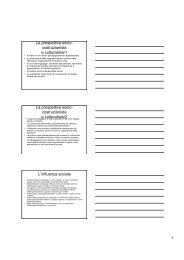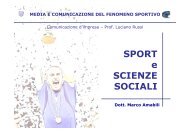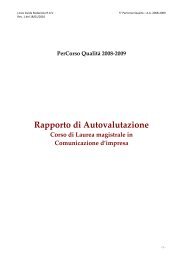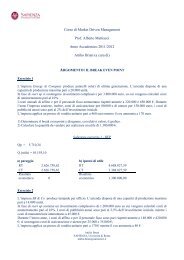Tesi per una semiotica delle culture - Facoltà di Scienze della ...
Tesi per una semiotica delle culture - Facoltà di Scienze della ...
Tesi per una semiotica delle culture - Facoltà di Scienze della ...
Create successful ePaper yourself
Turn your PDF publications into a flip-book with our unique Google optimized e-Paper software.
146 IVANOV, LOTMAN, PIATIGORSKIJ, TOPOROV, USPENSKIJ<br />
verso il quale o<strong>per</strong>ano i suoi meccanismi generativi. Da<br />
questo punto <strong>di</strong> vista, sarebbe possibile porre la questione<br />
<strong>delle</strong> attuali analisi semiotico-strutturali come fenomeni<br />
<strong>della</strong> cultura slava (il ruolo <strong>della</strong> tra<strong>di</strong>zione ceca,<br />
slovacca, polacca, russa e <strong>delle</strong> altre).<br />
1 Ed. or.: 1973, “Tezisy k semiotičeskomu izučeniju kul’tur (v primenenii k<br />
slavjanskim tektstam)”, in Semiotyka i struktura tekstu. Stu<strong>di</strong>a s´wie˛cone VII<br />
mie˛dz. kongresowi slawistów, a cura <strong>di</strong> M. R. Mayenowa, Warszawa, pp. 9-3;<br />
trad. it. 1979, “<strong>Tesi</strong> <strong>per</strong> un’analisi <strong>semiotica</strong> <strong>delle</strong> <strong>culture</strong> (in applicazione ai testi<br />
slavi)”, in La <strong>semiotica</strong> nei Paesi slavi. Programmi, problemi, analisi, a cura <strong>di</strong> C.<br />
Previgano, trad. <strong>di</strong> E. Rigotti, Milano, Feltrinelli, pp. 194-220. [Per questa traduzione,<br />
effettuata sulla redazione russa <strong>delle</strong> tesi, si è tenuto conto anche <strong>della</strong><br />
loro redazione inglese, comparsa nel 1973 col titolo <strong>di</strong> “Theses on the Semiotic<br />
Study of Culture (As Applied to Slavic Texts)”, in Structure of Texts and Semiotics<br />
of Culture, a cura <strong>di</strong> J. van der Heng, M. Grygar, The Hague-Paris, pp. 1-28, e<br />
firmata, nell’or<strong>di</strong>ne, da B. A. Uspenskij, V. V. Ivanov, V. N. Toporov, A. M. Pjatigorskij,<br />
Ju. M. Lotman. Della collazione <strong>delle</strong> due redazioni, cui ha collaborato<br />
Carlo Prevignano, sono dati i risultati nelle note, mentre nel testo, accanto ai<br />
termini russi che è parso necessario in<strong>di</strong>care, si sono riportati quelli inglesi corrispondenti<br />
nell’e<strong>di</strong>zione inglese, <strong>per</strong> consentirne un imme<strong>di</strong>ato riscontro].<br />
2 [Nella red. inglese è aggiunto: “artificiale – non artificiale”].<br />
3 [Nella red. inglese è aggiunto: “artificialità”].<br />
4 [L’antica denominazione <strong>della</strong> Russia].<br />
5 [Nella red. inglese è aggiunto: “del meccanismo <strong>della</strong> cultura”].<br />
6 [Nella red. inglese è aggiunto: “Andrebbe sottolineato che dal punto <strong>di</strong><br />
vista ‘interno’ la cultura appare come il membro positivo dell’opposizione<br />
suddetta, mentre dal punto <strong>di</strong> vista ‘esterno’ l’intera opposizione appare come<br />
un fenomeno culturale”.]<br />
7 [Nella red. inglese è aggiunto: “e un segno appare come <strong>una</strong> nozione secondaria,<br />
definibile a partire dal testo”].<br />
8 [La red. inglese ha: “il conflitto tra testo verbale e visivo”].<br />
9 [La red. inglese ha: “il problema <strong>della</strong> ‘grammatica del parlante’ (mittente<br />
[addressor]) e <strong>della</strong> ‘grammatica dell’ascoltatore’ (destinatario [addressee])”].<br />
10 [La red. inglese ha <strong>di</strong> nuovo: “L’orientamento <strong>della</strong> cultura al ‘parlante’<br />
(mittente) e all’ascoltatore (destinatario)”].<br />
11 Bisogna <strong>di</strong>stinguere un non testo dall’“anti-testo” <strong>di</strong> <strong>una</strong> data cultura:<br />
l’espressione che non viene conservata dall’espressione che viene <strong>di</strong>strutta.<br />
12 Sono rari, ma non sono impossibili, i casi in cui l’in<strong>di</strong>viduazione <strong>di</strong><br />
qualche messaggio come testo <strong>di</strong> <strong>una</strong> data lingua è determinata dalla sua appartenenza<br />
a un testo <strong>della</strong> cultura.<br />
13 [Nella red. inglese si legge: “testi fantastici e assur<strong>di</strong> del folclore russo”].<br />
14 [La red. inglese ha invece: “Per testo si intende soltanto un messaggio<br />
che svolge entro la cultura data <strong>una</strong> funzione testuale”].



![(Microsoft PowerPoint - Lezione 8b.ppt [modalit\340 compatibilit\340])](https://img.yumpu.com/15217439/1/190x135/microsoft-powerpoint-lezione-8bppt-modalit340-compatibilit340.jpg?quality=85)
